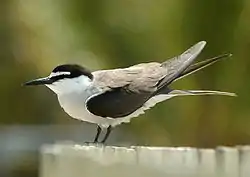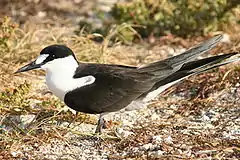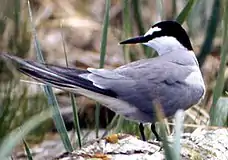Onychoprion
Onychoprion, the "brown-backed terns", is a genus of seabirds in the family Laridae. The genus name is from Ancient Greek onux, "claw" or "nail", and prion, "saw".[1]
| Onychoprion | |
|---|---|
 | |
| Sooty tern, Onychoprion fuscatus | |
| Scientific classification | |
| Kingdom: | Animalia |
| Phylum: | Chordata |
| Class: | Aves |
| Order: | Charadriiformes |
| Family: | Laridae |
| Subfamily: | Sterninae |
| Genus: | Onychoprion Wagler, 1832 |
| Species | |
|
Onychoprion lunatus | |
Species
Although the genus was first described in 1832 by Johann Georg Wagler the four species in the genus were until 2005 retained in the larger genus Sterna, the genus that holds most terns.[2]
Three of the four species are tropical, and one has a sub-polar breeding range. The sooty tern has a pan-tropical distribution; the bridled tern also breeds across the Tropical Atlantic and Indian Ocean but in the central Pacific it is replaced by the spectacled tern. The Aleutian tern breeds around Alaska and Siberia but winters in the tropics around South East Asia.
| Image | Scientific name | Common Name | Distribution |
|---|---|---|---|
 | Onychoprion lunatus | Spectacled tern | tropical Pacific Ocean |
 | Onychoprion anaethetus | Bridled tern | Red Sea, Persian Gulf, Pacific Ocean, western Indian Ocean, Caribbean and West Africa. |
 | Onychoprion fuscatus | Sooty tern | Red Sea across Indian Ocean to at least central Pacific. |
 | Onychoprion aleuticus | Aleutian tern | Alaska and easternmost Siberia to Australia |
Manutara is the Rapa Nui language name for spectacled and sooty terns. Both arrive at Easter Island and hatch their eggs on the island called Motu Nui, an event that was used for an annual rite called Tangata manu.
References
- Jobling, James A (2010). The Helm Dictionary of Scientific Bird Names. London: Christopher Helm. p. 282. ISBN 978-1-4081-2501-4.
- Bridge, E. S.; Jones, A. W. & Baker, A. J. (2005). A phylogenetic framework for the terns (Sternini) inferred from mtDNA sequences: implications for taxonomy and plumage evolution Archived 2006-07-20 at the Wayback Machine. Molecular Phylogenetics and Evolution 35: 459–469.